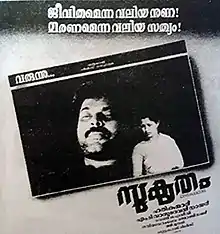Sukrutham
Sukrutham (transl. Good deed) is a 1994 Malayalam-language film directed by Hari Kumar, written by M. T. Vasudevan Nair. It stars Mammootty, Shanthi Krishna, Gautami and Manoj K. Jayan.[2] The film is based on the subject of complex human relationships, inevitable human death and the consequences to the relatives of the deceased. Bombay Ravi had composed the songs while the background music was provided by Johnson. The film was critically acclaimed and won 2 national awards - National Film Award for Best Feature Film in Malayalam and the National Film Award for Best Music Direction. The film is now considered to be a classic in Malayalam cinema.
| Sukrutham | |
|---|---|
 Poster | |
| Directed by | Hari Kumar |
| Written by | M. T. Vasudevan Nair |
| Produced by | Dr. M. M. Ramachandran (Atlas Ramachandran) |
| Starring | Mammootty Gautami Shanthi Krishna Manoj K. Jayan |
| Cinematography | Venu |
| Edited by | G. Murali |
| Music by |
|
| Distributed by | Chandrakanth Release |
Release date |
|
Running time | 148 minutes |
| Country | India |
| Language | Malayalam |
Plot summary
Ravishankar is a journalist, who is a victim of blood cancer. The knowledge of his disease and the death on its way hugely disappoints him and he loses all his hope in life. He tries to arrange things in and around his life so that the people he care suffer the least due to his death. In an unheard of gesture, he even pressures his (initially horrified) wife Malini to get involved with their friend Rajendran so that she won't be alone after Ravi's death. Ravi goes back to his village to spend his last days with his aunt, where his childhood sweetheart and cousin, Durga, who is still unmarried starts taking care of him.
Meanwhile, a doctor who is a friend of Ravishankar convinces him to undergo holistic treatment at his centre. The centre is driven by a theme that each and every cell in our body has a mind which decides whether the body it belongs to should live or die. The treatment does wonders to Ravi and he is on his way to recovery and final checkups confirm that his blood count is normal. Ravi is delighted to come back to his life; but everything in his hope and joy of life is squandered when he realises that his death was more awaited than his recovery. Everybody, including the relatives, find it awkward to move on now that he is going to live rather than die, foiling all earlier plans. Ravi gets a lethal blow when even Durga, who clearly had no worldly motives, confesses that her affection was directed at a dying man, and not available anymore as he was going to live, and rejects his (borderline romantic) overtures as she clearly doesn't want to become a concubine. Back at his home, he gets his final blow when he realises that his recovery is a blow to even his wife, since Rajendran has by now started sleeping with her.
Ravi finally composes his own obituary in his office and commits suicide.
The final line to the audience is the old message that "death is the ultimate truth, an inevitable part of life" with an addendum that it can even be, "in its own way, a moment to rejoice".
Cast
- Mammootty as Ravishankar
- Shanthi Krishna as Durga
- Gautami as Malini
- Manoj K. Jayan as Rajendran
- Kaviyoor Ponnamma as Cheriyamma
- Shivaji
- Narendra Prasad as Doctor Unni
- Oduvil Unnikrishnan as Cheriyachan
- Kuttyedathi Vilasini as Durga's Mother
- Krishna Kumar
- V. K. Sreeraman as Doctor Rahim
Music
Bombay Ravi won the National Film Award for Best Music Direction in 1995 along with Parinayam. Background score was composed by Johnson and he won the second National Film Award for Best Music Direction in 1995.[3] The lyrics were penned by O. N. V. Kurup.
| Song | Singer(s) |
|---|---|
| "Bandhangale" | K. S. Chithra |
| "Kadalinnagaadhamaam Neelimayil" | K. J. Yesudas, K. S. Chithra |
| "Om Poorna" | K. J. Yesudas |
| "Poroo" (Ennodothunarunna Pularikale) | K. J. Yesudas |
| "Sahasradalasam" | K. J. Yesudas, Chorus |
Release
Reception
Reviewing the film at the Indian Panorama section of the International Film Festival of India, S. R. Ashok Kumar of The Hindu wrote that "Venu's cinematography and Bombay Ravi's music are plus points for this film".[4] The film got the 1995 National Film Awards for best feature film in Malayalam and best background score.[5][6]
Box office
The film was a commercial success.[7]
Awards
- 1994 : Filmfare Award for Best Film - Malayalam - M. M. Ramachandran (Film Producer)[8]
- 1994 : Ramu Kaaryatt Award for Best Actress - Malayalam - Gautami
References
- "Hitukalude Kadha". Vellinakshathram. p. 38. Retrieved 4 May 2019.
- Syed, M. H. (2005). Encyclopaedia of Modern Journalism and Mass Media. Anmol Publications. p. 214. ISBN 978-81-261-2420-6.
- P.K.Ajith Kumar (4 August 2006). "Conjuror of tunes". The Hindu. Archived from the original on 14 March 2007.
- Kumar, S. R. Ashok (12 January 1996). "The cream of Indian cinema". The Hindu. p. 26. Archived from the original on 21 December 1996.
- National Film Development Corporation of India (1998). Indian Cinema. Ministry of Information and Broadcasting. p. 108.
- "Conjuror of tunes". The Hindu. 4 August 2006. Archived from the original on 14 March 2007. Retrieved 20 April 2009.
- "'Sukrutham': Revisiting Mammootty's poignant film on life and death". The News Minute. 23 May 2020. Retrieved 16 March 2022.
- https://ia601901.us.archive.org/14/items/42ndAnnualFilmfaresouthawardsTeluguMalayalamwinners/IMG_20161006_074048%5B1%5D.jpg